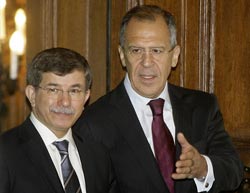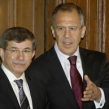
Turkey and Russia Move Closer to Visa-Free Travel
Publication: Eurasia Daily Monitor Volume: 8 Issue: 17
By:

Russian Foreign Minister, Sergey Lavrov, visited Turkey in order to attend the talks between Iran and the P5+1. Prior to the start of the talks on the Iranian nuclear issue, Lavrov held crucial meetings with his Turkish counterpart, Ahmet Davutoglu, on bilateral relations as well as regional issues. In particular, Lavrov and Davutoglu chaired the first Turkish-Russian Joint Strategic Planning Group at the historic Ciragan Palace in Istanbul. The talks were a preparatory meeting within the framework of the High Level Strategic Cooperation Councils, which Turkey initiated in recent years with many countries, including not only some of its Middle Eastern neighbors but also Greece and Russia.
The joint planning meeting sought to prepare the ground for the Strategic Cooperation Council to be held in Moscow in the coming months, possibly during Turkish Prime Minister, Recep Tayyip Erdogan’s, visit to Russia in mid-March. Until then, several other high level contacts will occur between Turkish and Russian delegations, underscoring the intensity of the flourishing bilateral cooperation between the two nations.
A major item during the Davutoglu-Lavrov meeting was the issue of visa liberalization, which was agreed upon by the leaders of the two countries last year. The issue was first raised during Erdogan’s meeting with his Russian counterpart, Vladimir Putin, in Moscow in January 2010. Following the Visa Exemption Agreement allowing visa-free travel for up to one month, which was signed in May 2010 during Russian President Dmitry Medvedev’s visit to Ankara, Turkey expressed eagerness to conclude this matter as soon as possible (EDM, May 20, 2010). Turkish sources admitted that Moscow could not reciprocate with Ankara, yet, they attributed it to the overall complicated nature of the Russian bureaucracy. Indeed, in an obvious affirmation of these differing perspectives on the issue, the Turkish government completed the ratification of the agreement promptly. The Russian Duma, however, has yet to discuss it (Cihan Haber Ajansi, January 20).
Nonetheless, recently both countries took an important step towards removing a major obstacle to the realization of a visa-free regime. In Moscow, Turkish and Russian diplomats signed a Readmission Agreement, which especially the Russian side deems important as part of its fight against illegal migration. Under this agreement, both countries commit to readmit immigrants who illegally enter the other country through their territory. Reportedly, Moscow has become concerned about the increasing number of illegal immigrants arriving in Russia through Turkey, en route to their final destinations in Eastern Europe and the EU (Zaman, January 18). When both countries complete the ratification process, they will start implementing these protocols simultaneously (www.mfa.gov.tr, January 18).
During the Davutoglu-Lavrov joint press conference, Davutoglu praised the progress on this issue, and added that he hoped the legal procedures would be finalized soon, so that visa-free travel will be implemented following the planned High Level Cooperation Council in Moscow. Davutoglu maintained that it would be an historic step that will further boost the already high level contacts between the two nations (Anadolu Ajansi, January 20).
Lavrov was asked to comment on Turkey’s potential role in the resolution of the Iranian nuclear issue. Lavrov commended Turkey’s contribution and its provision of a venue for the P5+1 talks in Istanbul. Nonetheless, Lavrov also added a note of caution, referring to the complex nature of the problem, and emphasized that if the Istanbul meeting sets an agenda for future meetings it would achieve some positive results. The Russian foreign minister reiterated the importance of tackling this issue within a broader framework, highlighting the need to address other regional and economic challenges. On the eve of the talks, Lavrov raised the possibility of rolling back the sanctions on Iran, though he also urged Iran to allow for more intrusive inspections of its nuclear facilities as a demonstration of its goodwill (Zaman, January 21).
Davutoglu reiterated that Turkey is providing merely a venue, and is not directly involved in the talks between the P5+1 and Iran. This limited role of facilitating talks, though important in itself, indicates a scaling back from Turkey’s earlier efforts to play a more proactive diplomatic role in this crisis. Previously, Ankara had gone to great lengths to interject itself as a mediator between Iran and the West and influence the resolution of the standoff over Iran’s nuclear program. Turkey’s efforts, in coordination with Brazil, resulted in Iran’s signing the Tehran declaration on a nuclear swap deal (EDM, June 1, 2010).
The success of the US in securing a UN Security Council resolution for a new round of sanctions (despite Turkey voting against it) and developments since, has rendered the Tehran Declaration largely ineffective. Yet, the Turkish side continues to emphasize that the declaration offers a constructive legal framework on which further diplomatic initiatives might be based. Davutoglu, thus, referred to the Tehran Declaration following his meeting with Lavrov, and stressed Turkey’s readiness to assist the parties if they decided to return to the avenues opened by that declaration to address the Iranian nuclear issue.
Davutoglu also sent some messages to Tehran. The Turkish foreign minister urged the Iranian leadership to provide assurances to the international community that it would not seek to develop nuclear weapons, though reiterating that all countries have a right to the peaceful use of nuclear technology. This emphasis on Iran offering assurances was also an important development, considering the criticism of Turkey’s position on the Iranian issue. Turkey’s position is often criticized for being pro-Iranian or offering Iran a shield against Western sanctions. Davutoglu is working hard to eradicate this image and reassure the international community of Turkey’s impartiality on this issue. Moreover, Davutoglu’s emphasis on the right to peaceful use of nuclear technology is significant, since he believes that Turkey also needs to acquire nuclear power plants in order to meet growing energy demands. By constantly emphasizing this right, Davutoglu hopes to remove any objections that might be raised against Turkey’s efforts to obtain nuclear technology.




